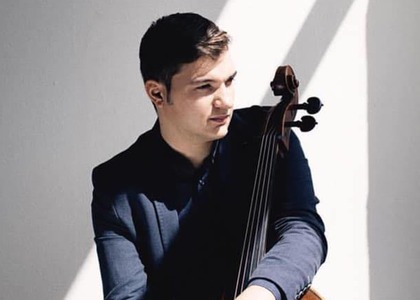> [Archived] Interviews

RRM 25 - Interview with cellist Andrei Ioniță
I have always been impressed by the proposed schedule of programs and the international opening. The actions of Radio România Muzical are commendable, the openness it brings to the Romanian public seems wonderful to me and what I would like would be for other musical institutions in Romania to be able to rise to the level of volume and quality that Radio România Muzical presents.
You are already very connected to Radio România Muzical. You were invited to be part of several projects and we were glad that you accepted each time. We are honored to collaborate with one of the most important Romanian musicians of our time. Two of the events organized by Radio România Muzical in which you recently participated were the Pink Concerts and the Heirs of Musical Romania. Since the first series of recitals, these Pink Concerts, took place without an audience at the Radio Hall, but with listeners on the radio, and what second had the presence of music lovers in the Radio Hall, I wanted to ask you how you felt the atmosphere from this point of view in the two recitals? Was it perhaps more challenging to sing without an audience in the room?
First of all, I would like to express my gratitude for the trust given by Radio România Muzical. We have already had numerous collaborations, both together with the National Radio Orchestra and with the Chamber Orchestra. It is always a great pleasure to return to the stage of the Radio Hall. We also considered absolutely commendable this initiative of the Pink Concerts and for us, for the young artists, it was a sign of trust from the Radio and also gave us a new hope for the months to come. It was a great joy to sing on that stage and I felt the presence of the listeners at home, even though perhaps a more bleak atmosphere prevailed in the concert hall.
For us, you also did record sessions and I was wondering if you generally like being involved in something like that. The two totally contrasting opinions are already famous - that of Celibidache, who talked about canned music, referring to recordings, and that of Glenn Gould, who saw in these recording sessions a kind of personal laboratory. Where do you place yourself?
I would say that my biggest preference is for the live atmosphere in the concert. From my point of view, nothing compares to that atmosphere created directly between the performer and the audience. However, I am a fan of the recordings. I also agree with Glenn Gould on this laboratory issue, with this almost scientific dimension. I've already had a lot of collaborations with the BBC in the New Generation Artists program that I've been a part of and I can say that it's a gratifying experience and one that still fulfills you aristically to be able to get into detail in the works you're recording and it was also a great joy at the beginning of this year. when we recorded a recording session in a trio band. It was a wonderful collaboration with the sound engineers there as well, we also thank Mrs. Cristina Comandașu for the initiative, not only of these recording sessions, but also of organizing all the chamber concerts that we have sung so far.
As a listener, do you have any memories with Radio România Muzical or a first contact?
I grew up listening to Radio România Muzical, listening to live concerts. I've always beenalso impressed by the proposed schedule of programs and the international opening. Sometimes maybe in the eveninglate I was also listening to those concerts broadcast through the EBU network. All I can say is that the Actions of Radio România Muzical are commendable, the openness it brings to the Romanian public seems wonderful to meand what I would like would be for other musical institutions in Romania to be able to rise to the level of volume andof quality that Radio România Muzical presents.
Translated by Translated by Beatrice-Andreea Porumb
University of Bucharest, Faculty of Foreign Languages and Literatures, MTTLC, year I
Corrected by Silvia Petrescu














